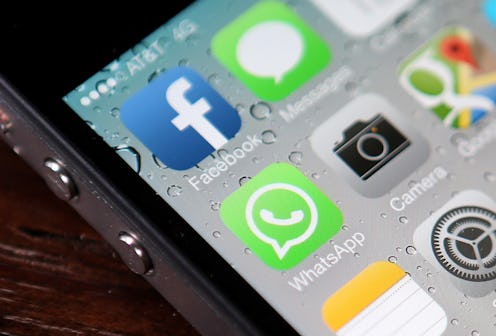News
3 Theories Why Facebook Paid $16 Bil. For WhatsApp
The nation's collective jaw dropped Wednesday when we heard Facebook is buying WhatsApp for $16 billion. Seeing as many people in the U.S. haven't even heard of WhatsApp, it seems like total madness that Facebook would lay down $4 billion in cash and $12 billion in shares, with an extra $3 billion of stock paid out over the next four years, for the app — especially as Facebook only stumped up $1 billion for Instagram. And, c'mon, everyone loves Instagram! So, why did Facebook buy WhatsApp, and why was the app worth that much to Mark Zuckberberg?
In case you weren't quite sure, $19 billion is a serious amount of money, even in the high-stakes investment market. In fact, based on the purchase price, Facebook thinks WhatsApp is worth more than American Airlines, ConEd, Harley Davidson or Ralph Lauren.
It may seem crazy, but Facebook CEO Mark Zuckerberg is nothing if not a man with a plan. It's kind of hilarious that he could have had WhatsApp for free if only Facebook had offered a job to co-founder Brian Acton when he applied back in 2009, but Zuckerberg clearly thinks $19 billion is a fair price to pay to rectify the mistake.
Here are a three theories behind the colossal valuation...
1. WHATSAPP HAS 450 MILLION MONTHLY USERS
WhatsApp is most popular instant messaging app on the market by far. Not only does it have 450 million monthly users, a whopping 310 million of them (70 percent) use the app daily. And its gigantic user base is growing at a ridiculously fast rate. More than a million new users sign up for the service every single day.
As Facebook pointed out in their own summary of the acquisition, the number of messages sent through WhatsApp is already "approaching the entire global telecom SMS volume." Around 36 billion messages are sent and 19 billion received per day. If growth continues at this pace the service will soon be hurtling toward one billion users, and hitting that marker will make Zuckerberg very happy.
2. IT'S ONE MORE STEP IN FACEBOOK'S QUEST FOR GLOBAL DOMINATION
As Forbes points out, everyone in the US who wants a Facebook account has a Facebook account. If Zuckerberg wants to keep growing the brand, he needs to delve deeper into markets in other parts of the world where Facebook isn't as popular.
This is where WhatsApp comes in. Zuckerberg's ultimate goal is to connect the entire world, and many people outside of Facebook's current reach are avid users of WhatsApp.
The acquisition also allows Facebook to carve out a little bit more space on your home screen. The social-media giant now owns four of the most popular smartphone apps in the world. Chances are, most smartphone users can't go a day without using one of its apps.
3. NO ADS, NO GAMES, NO GIMMICKS
This is the WhatsApp mantra. The messaging service keeps things incredibly simple, and users seem to like that. Instead of collecting personal information about each user and using that information to bombard that user with irritating advertising, WhatsApp gives you the first year of use for free and then asks you to cough up a whopping, err, $0.99.
And every message you send is completely free. WhatsApp co-founder Jan Koum has promised that the buyout won't change anything for WhatsApp users, and he has no intention of introducing ads. It's no wonder really that it beats out the competition.
